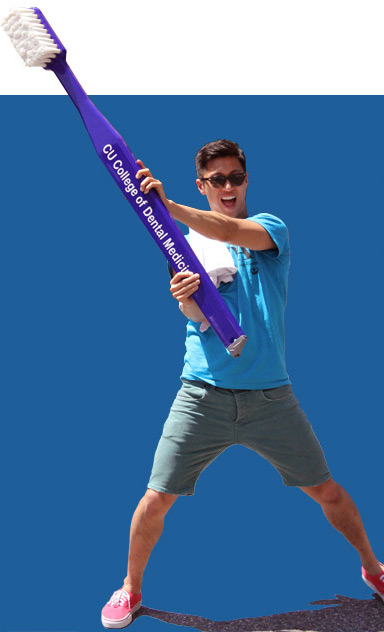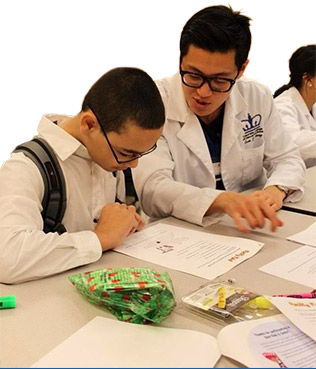
Evan Chang
Making the most of his one shot
After studying psychology and management at the University of California, Irvine, Evan Chang began a career in banking. But after living in China and working for a large financial institution, he decided the industry wasn't a good fit. In search of a new direction, he discovered a latent interest in dentistry.
Now, after completing CSUF's Pre-Health Professions Certificate program, Evan is in his third year at Columbia University's College of Dental Medicine. Here he talks about switching careers, choosing dentistry and getting into one of the top dental schools in the country—and how you can, too.
Q: Were you interested in being a dentist while you were growing up?
No, not at all. I had so many cavities as a kid, and I was terrified of going to the dentist.
Here's how it happened: during and after college, I was working for Wachovia Bank. I didn't see myself going much further in that industry though, so through extensive networking, I ended up shadowing one of my clients, who was a dentist.
Now, I had never taken a biology or science class before. But when I saw all the equipment and dexterity involved, I was fascinated. Also, I like how dentistry is a balance between science, art and business.
Q: Do you think your cognitive psychology background will also help you be a better dentist?
Absolutely. Being able to relate to your patients is huge. It's important to be able to explain procedures and confidently answer questions so they will understand and feel comfortable.
Previous dental experiences can leave a lasting traumatic impression for some people. It's a bunch of sharp drills and lot of noise; but if you're able to break down those walls, your patients' experiences are going to be positive.
 Chang participating in Give Kids A Smile Day 2013, where volunteers provide dental
screenings and oral health education for kids.
Chang participating in Give Kids A Smile Day 2013, where volunteers provide dental
screenings and oral health education for kids.Q: So your goal is to not only be a great dentist, but to provide a great patient experience?
Absolutely: a whole health-professional experience. It comes down to something that Columbia University emphasizes: the full body. You're not just working on the mouth, but looking deeper at what's systemic, what's going on in the body. Like, are their signs here of a problem that could lead to something more serious?
Going through a rigorous medical curriculum can get frustrating at times because you initially don't think that anything outside the mouth is applicable, but over time you begin to realize how integrated the body is.
Q: Is that the sort of education you were seeking when you applied to dental schools?
Yes. Though, initially, my top choices were solely California schools. But when I had my interview in New York I was so impressed with everyone there. It's a really small class and a tight-knit community, which was what I was looking for, and more importantly it just seemed like a good fit.
We have 80 people in my class at Columbia. Having that small cohort helps with getting to know your classmates and the faculty better. I went to a fairly large undergraduate university, so I didn't want to just be another number again.
Q: Is working within your cohort at Columbia similar to the experience of working within a cohort at Cal State Fullerton?
Definitely. Cal State Fullerton really emphasizes the cohort cohesiveness. You are all suffering through the same classes, all applying to schools at the same time. You would think it would be competitive, but it isn't. The camaraderie you build is too strong.
Our cohort was really tight: people are sharing notes and helping each other out. When I first came to Fullerton I thought I would just take the classes and get out of here. But I'm still in touch with my advisor, Dr. Christina Goode, and my classmates. Keeping in touch with them and seeing their progress has been great.
Q: How helpful was that advising for getting into dental school?
It was huge. This program taught me professionalism to the next level. There wasn't a particular class on it, but Dr. Goode and the faculty constantly stress its importance. You've got to think twice about certain Facebook posts or how you carry yourself in certain situations. All eyes are on you. And that's not just for when you are applying to dental school, but more importantly when you're out in the real world. What patient is going to want their dentist showing up late or all scruffy?
I also did a mock interview at the Career Center, in which they record you and give great feedback on what to improve on. CSUF has so many helpful resources like that to take advantage of.
Q: Did that preparation help with your real interviews?
Absolutely. See, the schools already know your grades and test scores. At Columbia, my interviewer just closed my file and said, "Tell me what you do outside of school. Tell me about your hobbies. Tell me about your family." They want to see the person as a whole. You can be great at numbers, but social capabilities and interacting with people is half the game in health professions.
If you have the numbers, you'll get the interview. To get past the interview you have to be personable and be able to talk to people. That's something I learned by working closely with Dr. Goode. I thought I already knew it all from my previous career, but I learned so much from her.
You can be great at numbers, but social capabilities and interacting with people is half the game in health professions.
Q: Do you have advice for anyone thinking about entering the Pre-Health Professions Certificate program?
You can get by with the bare minimum and still get a degree, but you only get one shot at everything. In this post-bacc program you really should take advantage of every opportunity.
Now, there are people who focus solely on course work, which is completely fine. They are probably getting great grades. But when you apply to graduate programs, admissions also want to see what you do outside the classroom.
And I'm trying to do that at Columbia, too. I do a lot of volunteer work — which I love. I'm involved in student government, and I attend to a lot of alumni events. It helps provide balance. I'll go crazy if all I do is study.










